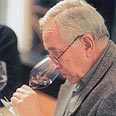
Israeli wine flows onto international shelves
Modern techniques imported from top winemaking nations helping Israeli wine find space on shelves from Paris to New York. 'There is no contradiction between wines that are kosher and wines that are excellent,' says wine critic Daniel Rogov
Israeli wine has long stirred up associations with the syrupy libations of religious rituals, but modern techniques imported from top winemaking nations are now helping it find space on shelves from Paris to New York.
"Today, you'll find that people are looking for Israeli wines that meet international standards and the good thing is we are actually producing wines like that," Israeli wine critic Daniel Rogov says in an interview at a busy Tel Aviv wine shop.
"There is no contradiction between wines that are kosher and wines that are excellent".
Israeli wineries, both industrial-scale and boutique, make over 33 million bottles a year, according to the Israeli Wine Council, but the vast majority of Israeli wine is kosher or made in accordance with Jewish dietary laws.
Whilst the rabbinical seal has long been associated with wines made to appeal to observant Jews rather than connoisseurs, the quality of Israeli wines is improving, helped by government incentives for smaller producers, and some vintages are now garnering international plaudits.
Robert Parker, among the world's most influential wine critics, has heaped praise and points on some 40 Israeli wines. Fourteen of them won more than 90 out of a maximum 100 points in Parker's rating system.
Wines from neighboring Lebanon, which traces its winemaking industry back over 4,000 years, have been winning international awards for decades. Israel enjoys the same Mediterranean climate.
Weighing in with 93 points was the red 2003 Yatir Forest label from a subsidiary of Carmel Winery.
Founded by the Baron Edmond James de Rothschild, an early 20th-century Zionist philanthropist, Carmel is Israel's largest winery, accounting for 40% of the Jewish state's contemporary wine market.
But along with many of its 200-odd rival Israeli wineries, Carmel has recently been applying methods learned from France, Australia and California, to locally grown grapes.
"Our chief winemaker studied in France, so we've learnt from the traditions of France but we also make use of the technologies from places like Australia and California," Adam Montefiore, marketing director for Carmel Winery, said at a wine festival in Jerusalem this month.
"We feel in the last 10, 15 years, Israeli wines are really making world class wines."
Montefoire says Carmel produces a range of wines both for those who want to "drink wine without tasting it" and for connoisseurs. Prices range from $10 to $100 a bottle. Half of Carmel's annual production of 15 million bottles is exported to the United States, Europe and Asia.
Israel exports roughly $22 million dollars worth of wine a year, according to the Central Statistics Bureau.
Experts and exports
Founded in 2002, the family-owned Pelter winery in the Golan Heights benefits from the cool climate and water-rich soil of the plateau, which Israel captured from Syria in the 1967 war and annexed in 1981 -- a move rejected by the United Nations.
Sam Pelter, whose son Tal founded the winery after extensive wine-making studies in Australia, says he combines Australian techniques and technology with Golan grapes. His wines sell at $18-$50 a bottle and are sold in the United States and Europe.
Some 18-20 percent of Israeli wine comes from the Golan, according to wine critic Rogov, though wines made on disputed land can sometimes invite controversy.
Last December, Syria protested to UN leaders that Israel had distributed Golan wine as year-end holiday gifts to UN staff. In 2006, Israel complained that Sweden was labelling Golan wines as coming from Israeli-occupied Syrian territory.
Israeli settlers also make wine on occupied Arab land in the West Bank, sometimes drawing boycotts by peace activists.
Political sensitivities have not stopped Pelter's wines making a splash abroad.
Pelter's most famous wine is Trio 2007, which took a double gold award at Finger Lakes competition in New York. A blend of cabernet sauvignon, merlot and cabernet franc grapes aged 14 months in French oak barrels, it has hints of fruit and cocoa.
Chris, an American visitor attending the Jerusalem festival, described Trio 2007 as a "different and surprising" wine.
Other tourists also expressed surprise over the lightness of Carmel's red wines, and the sweetness of their whites.
"For my taste, (the red wine is) a little on the light side. I'm looking for a red wine that has the kind of body that I would find in, say, a good robust Australian red wine," said Malcolm Kessin of Atlanta, Georgia.
While Israel's wine industry is growing, Rogov says vintners have yet to sort out the best of Israel's 42 grape varietals.
"We have to find out which grapes are most suited to our particular sub-climates, different regions of Israel, et cetera, which is no sin," said Rogov. "Remember – we're still young."










